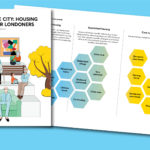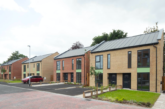Too many older Londoners are unable to access the housing they need to live independently for longer, according to a new report by think tank Centre for London. The report, Third Age City: Housing for older Londoners, makes the case for a stronger and more coordinated approach to building homes that suit London’s diverse population of older residents.
Older people currently have four main housing options available to them as they age: remaining in their current home, living with family or friends, living in a home specifically designed for older people (specialist housing) or living in a care home.
The report says that London is developing less than half of the new specialist homes needed overall, as land costs make other forms of housing more attractive to developers. Inner London boroughs are only building 25% of the homes required each year to reach London-wide targets. Outer London is doing better, but homes are not evenly distributed between boroughs. In some local authorities, the number of new homes is actually negative, as existing older people’s housing is converted to other uses.
The report argues that this gap between what older people need and what is actually available is likely to continue to grow: the number of Londoners aged 65+ is expected to increase by more than a quarter (29%) over the next decade. Most of this growth will be in inner London.
The report also highlights that building new homes alone will not be enough to ensure older people have a genuine choice about where they want to live. Existing homes should be made easier to adapt and new homes should be designed with adaptations from the outset. 52 per cent of Londoners over the age of 65 have a disability, compared to just 9% of those under 65, so it is vital that homes are fit for people to age well and live independently.
Finding the right place to live is not only dependent on the types of homes on offer but also on people’s knowledge. Some older people the Centre spoke to said they struggled to find accurate and relevant information about different housing options as they aged.
To respond to these issues, Centre for London has made recommendations to national, city and local government:
- Setting targets and building specialist homes Every London borough should set targets for how many specialist homes should be built each year and where. These targets should meet or exceed those benchmarked in City Hall’s London Plan. Local authorities should also do more to shape the range of options for older people in their area and the Government should reward those who build more older people’s housing.
- Communicating the options — The government should provide dedicated funding to local authorities to provide older people’s housing advice and support services. Local authorities should work with housing associations and community groups to reach people in their 50s and 60s about future housing choices.
- Making homes adaptable as people age — Local authorities and developers should ensure that new-build homes are designed to be more adaptable and flexible, for example by including step-free entrances and installing sockets at appropriate heights.
Claire Harding, Research Director at Centre for London said: “Older people make a vital contribution to our city and their wants and needs are diverse. All Londoners deserve to have a genuine choice about where and how to live as they age but we can’t offer choice if there aren’t enough homes for older people to start with.
“It’s vital that policy makers take this need seriously, and focus both on providing enough homes and making sure people understand the options available to them as they age.”
Philip Tait, Head of Development for Canada Water at British Land commented: “A successful place appeals to people of all ages, young and old. Yet few developers design for older people, even though this is an increasingly core demographic.
“We’re delivering up to 3,000 homes at Canada Water and, as part of this, we want to create an inclusive, intergenerational community.”
Jason Leek, CEO of Riverstone added: “This report clearly demonstrates the need for more specialist housing in London to cater for our ageing population. Our residences at Riverstone Fulham and Riverstone Kensington are carefully designed to offer over 65’s wider choice when it comes to growing older independently and living the life that they want to live.
“Specialist housing or retirement living also has the ability to help unlock the housing market and reduce the burden on public health services. We champion this report which will help further educate government, local authorities and the wider industry of the value that specialist housing can bring to our great city.”
Joanne Drew, Housing and Regeneration Director at Enfield Council commented: “As we tackle the housing crisis, local authorities have a key role to play in helping residents make best use of existing homes and being innovative with the types of housing that come forward through development. This Centre for London report puts an important focus on the needs of older Londoners.
“Through Enfield’s intergenerational design competition we explored how design can create multi-generational housing that works for everyone. The market is not currently providing these sorts of schemes so we concur with the report that local authorities should be rewarded for proposing solutions that work for older people.”
Abi Wood, Chief Executive, Age UK London said: “Whatever your age, housing has a huge impact on both physical and mental health. However for people in their 60s, 70s, 80s and older, living conditions can be an even more significant determinant of quality of life.
“Authoritative research on housing for the capital’s rapidly increasing older population has never been more needed. We’re delighted to support this excellent report, which provides a timely and robust analysis of the key housing issues facing older Londoners.”
In August 2020, Centre for London published London: A place older people to call home, which looked at older Londoners in depth.









